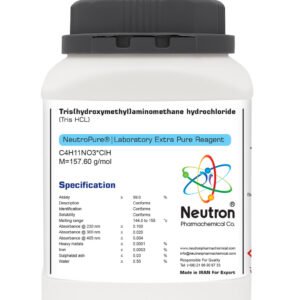محلول ائوزینY 0.5٪ آبی
| Density | 1.00 g/cm3 (20°C) |
| HS Code | 32041200 |
| Storage | +15 to +25 °C |
| SDS | available |
| Odour | odourless |
| Form | liquid |
| Color | dark red |
| Description | Conforms | ||
| Identification | Conforms | ||
| Solubility | Conforms | ||
| Density | ~ | 1 | g/cm3 |
| Application test | Conforms |
Eosin Y Solution 0.5% Aqueous is a commonly used dye solution in histology and cytology. It is particularly effective for staining cytoplasmic components and extracellular matrix in tissue samples. Eosin Y is a red dye and is often used in combination with Hematoxylin in the H&E staining technique, which is widely used for tissue examination.
🏭⚗️ Production
Eosin Y Solution 0.5% Aqueous is prepared by dissolving Eosin Y dye (a type of eosin) in distilled water to achieve a concentration of 0.5%. The solution is typically colorless or faintly colored until applied to tissue sections, where it produces a pink or red stain.
🔬 Properties
Color: Eosin Y Solution 0.5% is a pale pink or colorless solution before application, but once applied, it stains tissue components with a bright pink or red color.
Solubility: Eosin Y is water-soluble, which makes it easy to apply to tissue sections during staining protocols.
pH Sensitivity: The solution works optimally in a slightly acidic pH, which is why it is often used in combination with Hematoxylin to balance the pH of the tissue preparation.
🧪 Applications
Histology: Eosin Y Solution 0.5% is primarily used in Hematoxylin and Eosin (H&E) staining to differentiate cytoplasmic components and extracellular structures from nuclear structures, which are typically stained blue by Hematoxylin.
Tissue Examination: It is used to examine tissue samples under a microscope to identify various types of cells, detect abnormalities, and help in the diagnosis of diseases like cancer, infections, or inflammation.
Cell Biology: It is also used to study cell morphology and assess the condition of cytoplasmic structures in cell cultures.



